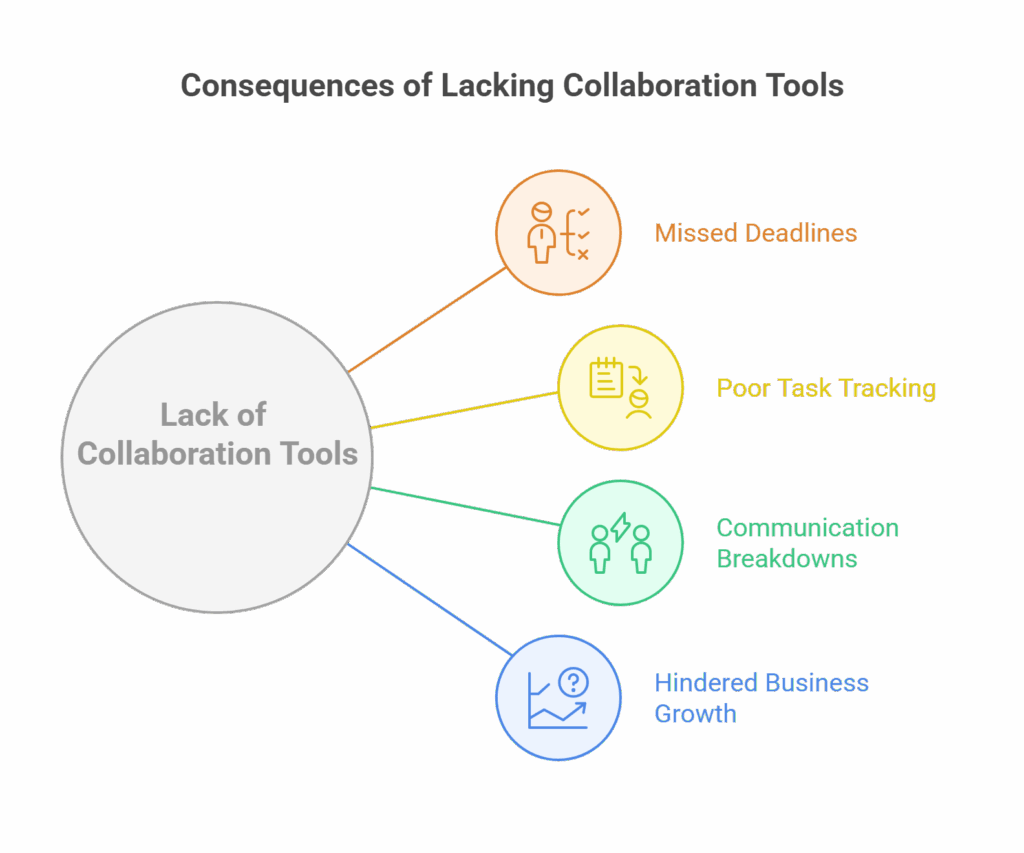Small Business Collaboration Tools play a crucial role in steering small businesses toward success. Especially today, with remote working, freelancers, and multi-department teams, staying connected is more important than ever. Effective collaboration acts as the backbone for both productivity and efficiency.

When teams collaborate well using the right tools, they can bridge communication gaps and increase synergy among members. This leads to better alignment with business goals and smoother workflows. However, without proper small business collaboration tools, many face challenges like missed deadlines, scattered communication, and poor task tracking. These issues can significantly impact a business's ability to grow and operate efficiently.
Challenges Faced by Small Businesses Without Effective Collaboration Tools
Collaboration is key to small business success, especially in today’s fast-paced world of remote work and distributed teams. Effective teamwork improves productivity, keeps projects on track, and reduces miscommunication. But without the right support, small teams often struggle to stay aligned.
That’s where Small Business Collaboration Tools become essential. Here’s what happens when they’re missing:
- Missed Deadlines
When updates and messages are scattered across platforms, it’s easy for important tasks to get lost, causing delays and frustration. - Poor Task Tracking
Without a centralized hub to monitor project progress, it’s difficult to manage workflows, assign responsibilities, or spot bottlenecks early. - Communication Breakdowns
Relying on inconsistent channels leads to confusion and slows down decision-making, affecting project outcomes. - Hindered Business Growth
Disorganized collaboration not only stalls productivity but can also prevent you from seizing time-sensitive opportunities.
Small businesses that invest in the right collaboration tools are better positioned to grow, stay productive, and avoid costly mistakes. Choosing the right Small Business Collaboration Tools can make the difference between chaos and clarity.
Types of Collaboration Tools for Small Businesses
Small businesses today rely heavily on collaboration tools to stay productive, organized, and competitive. With teams often working remotely or juggling multiple tasks, effective communication and coordination are essential. That’s where small business collaboration tools come in, helping streamline everything from messaging to project tracking.
Here are some essential tool categories:
- Team chat apps like Slack, Microsoft Teams, and Discord support real-time conversations, making internal communication fast and seamless.
- File sharing solutions such as Google Drive and Dropbox allow teams to store, share, and collaborate on documents without confusion or delays.
- Task management software like Trello and Asana help teams track projects, assign responsibilities, and ensure nothing slips through the cracks.
- CRM systems including HubSpot CRM and Zoho CRM promote collaboration by organizing client interactions and sharing notes across team members.
These tools not only reduce errors and miscommunication but also allow small businesses to stay agile and responsive in a fast-moving environment. Choosing the right set of small business collaboration tools can make all the difference in improving efficiency and reaching business goals.
Building Customized Collaboration Tools with Fuzen
Fuzen stands out as one of the most effective small business collaboration tools for teams seeking flexibility, affordability, and control. Designed for non-technical users, Fuzen’s no-code platform allows small businesses to build their own custom collaboration apps without needing developers or expensive SaaS tools.
- Build Your Own CRM for Team Collaboration
Fuzen lets you create a fully personalized CRM with features like shared client notes, task assignments, status tracking, file sharing, and internal notifications. This ensures your team is always aligned and working efficiently—without toggling between multiple tools. - No-Code Customization with AI Assistance
With Fuzen’s intuitive interface and AI integration, you can design workflows, CRM templates, dashboards, and project trackers—all without writing a single line of code. Just describe what you want, and the platform builds it for you. - Scalable and Easy to Maintain
Your collaboration tools grow with your business. Whether you're adding users, expanding workflows, or refining your CRM system, Fuzen scales effortlessly and requires minimal upkeep thanks to its easy-to-use builder. - Cost-Effective for Lean Teams
Unlike traditional collaboration software that comes with recurring subscription costs, Fuzen charges only for hosting. You can build and run powerful small business apps at a fraction of the usual software development costs, saving up to 80%.
Fuzen is more than just a platform—it’s a strategic investment in growth, productivity, and team synergy. By unifying collaboration, communication, and client management in one customizable tool, it proves to be an essential solution among modern small business collaboration tools.
Conclusion
Choosing the right small business collaboration tools is essential for companies aiming to hit their growth milestones. The right tools improve efficiency, streamline workflows, and keep teams aligned across projects and goals. With platforms like Fuzen, small businesses can create custom collaboration systems that fit their exact needs without the high cost or complexity of traditional software.
Fuzen empowers users to build personalized CRMs with custom templates, automate internal communication, and manage tasks using intuitive no-code development. Its cost-effective approach means you avoid recurring subscription fees while maintaining full control over your business operations.
By leveraging flexible, scalable tools like Fuzen, small businesses can simplify their collaboration workflows and stay competitive, laying the foundation for long-term success and smarter team management.

Pushkar is a seasoned SaaS entrepreneur. A graduate from IIT Bombay, Pushkar has been building and scaling SaaS / micro SaaS ventures since early 2010s. When he witnesses the struggle of non technical micro SaaS entrepreneurs first hand, he decided to build Fuzen as a nocode solution to help these micro SaaS builders.



